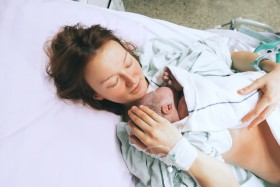Birthing Centers & the Risk of Birth Injuries

When the time comes to welcome a new child into the world, mothers aren’t necessarily limited to giving birth in a hospital. Some expectant parents like the idea of delivering their new child in the comfort of their own home with the assistance of a midwife and doula while others might be interested in heading to a birthing center instead of a regular hospital.
Birthing centers are often seen as being something of a compromise between having a home birth and having a hospital birth. Birthing centers offer expectant parents and their families a comfortable atmosphere that’s less clinical and offers more privacy than a hospital, but they’re typically staffed by midwives and nurses and provide access to different types of tools to help with labor that people might not necessarily have at home, such as whirlpool tubs. Birthing centers should also have an existing relationship with a nearby hospital so that patients can be quickly transferred in the event of an emergency.
Birthing centers also offer less medical intervention in the delivery process than hospitals. Midwives don’t have the same extensive medical training that MDs do and while there is typically some basic medical equipment available, birthing centers don’t offer many things that are very common at hospitals, such as epidurals, continuous heart rate monitoring, or drugs to induce labor.
Because birthing centers are so limited in their medical capabilities, they’re only recommended for women with low-risk pregnancies. If the mother-to-be is over the age of 35, carrying more than one baby, or has health problems such as high blood pressure or gestational diabetes, they are not an ideal candidate to give birth in a birthing center. If the baby is in a breech position, a birthing center likely won’t accept the mother as a patient.
Studies have shown that birthing centers are generally a safe delivery option for low-risk pregnancies. However, it’s important to remember that it’s possible for complications to occur during delivery even if the mother has had a perfectly healthy pregnancy. If you’re a good candidate to give birth in a birthing center and are interested in going that route, there are some things you can do to reduce the risk of injuries occurring in the event of an emergency.
It’s important to note that there freestanding birthing centers and hospital birthing centers. Freestanding birthing centers are independent from hospitals, but a growing number of hospitals recognize that many parents-to-be like what birthing centers have to offer and have started offering suites that allow people to have the birthing center-style experience. If you’re considering a freestanding birthing center, be sure to ask about their licensing and any accreditations they have. Licensing and regulation for birthing centers varies from state to state and some states, including Michigan, actually don’t have regulations for birthing centers.
You should also ask about a center’s relationship with nearby hospitals. Many birthing centers maintain a good relationship with local hospitals so that women in labor can quickly be transferred if needed and if you’re being cared for by a certified nurse midwife, she might be able to continue working with you even after a transfer. However, if a center doesn’t have a strong relationship with a nearby hospital, transfers can take longer and that can be a problem if it involves a complication that needs quick action.
Regardless of whether your child was born in a hospital or in a birthing center, negligence is never acceptable. If your child experienced an injury around the time of birth, it’s important to contact a birth trauma lawyer as soon as possible. At Goodwin & Scieszka, we’re experienced in working with the victims of birth injuries. Even if your child is a few years old, you may still have legal options. Contact us today to learn more.






